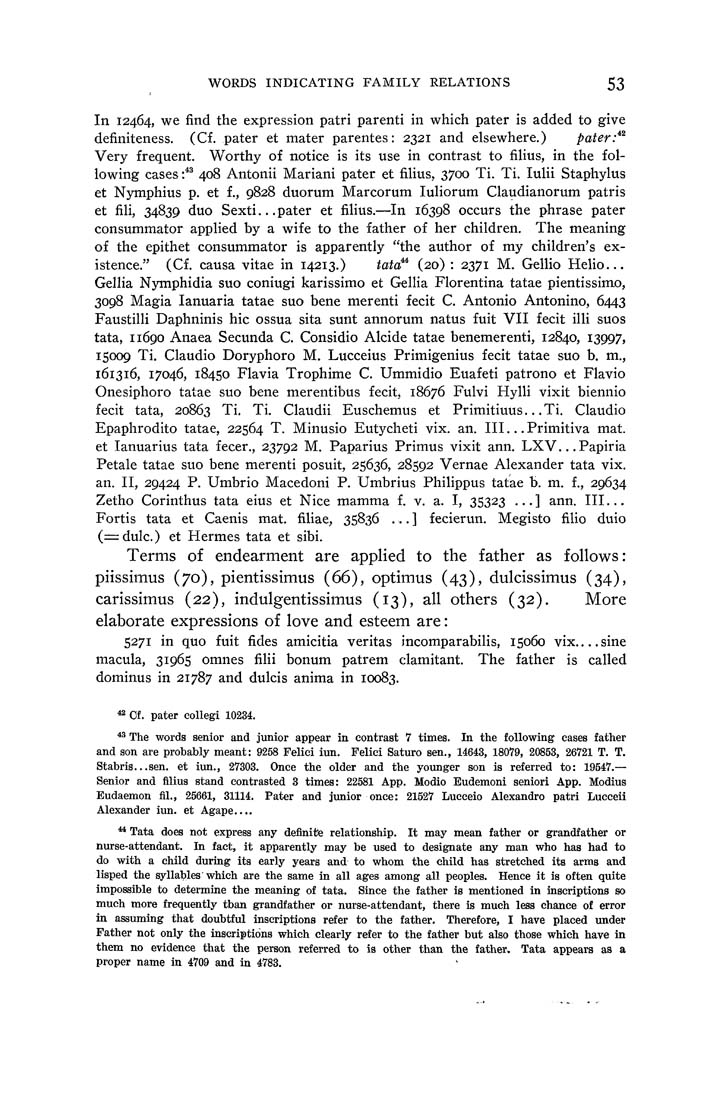WORDS INDICATING FAMILY RELATIONS 53
In 12464, we find the expression patri parenti in which pater is added to give
definiteness. (Cf. pater et mater parentes: 2321 and elsewhere.) pater:*^
Very frequent. Worthy of notice is its use in contrast to filius, in the fol¬
lowing cases :*^ 408 Antonii Mariani pater et filius, 3700 Ti. Ti. lulii Staphylus
et Nytnphius p. et f., 9828 duorum Marcorum luliorum Claudianorum patris
et fili, 34839 duo Sexti.. .pater et filius.—In 16398 occurs the phrase pater
consummator applied by a wife to the father of her children. The meaning
of the epithet consummator is apparently "the author of my children's ex¬
istence." (Cf. causa vitae in 14213.) tata^ (20) : 2371 M. Gellio Helio...
Gellia Nymphidia suo coniugi karissimo et Gellia Florentina tatae pientissimo,
3098 Magia lanuaria tatae suo bene merenti fecit C. Antonio Antonino, 6443
Faustilli Daphninis hie ossua sita sunt annorum natus fuit VII fecit illi suos
tata, 11690 Anaea Secunda C. Considio Alcide tatae benemerenti, 12840, 13997,
15009 Ti. Claudio Doryphoro M. Lucceius Primigenius fecit tatae suo b. m.,
161316, 17046, 18450 Flavia Trophime C. Ummidio Euafeti patrono et Flavio
Onesiphoro tatae suo bene merentibus fecitj 18676 Fulvi Hylli vixit biennio
fecit tata, 20863 Ti. Ti. Claudii Euschemus et Primitiuus.. .Ti. Claudio
Epaphrodito tatae, 22564 T. Minusio Eutycheti vix, an. Ill... Primitiva mat.
et lanuarius tata fecer., 23792 M. Paparius Primus vixit ann. LXV.. .Papiria
Petale tatae suo bene merenti posuit, 25636, 28592 Vernae Alexander tata vix.
an. II, 29424 P. Umbrio Macedoni P. Umbrius Philippus tatae b. m. f., 29634
Zetho Corinthus tata eius et Nice mamma f. v. a. I, 35323 ...] ann. III...
Fortis tata et Caenis mat. filiae, 35836 ... ] fecierun. Megisto filio duio
(=:dulc.) et Hermes tata et sibi.
Terms of endearment are applied to the father as follows:
piissimus (70), pientissimus (66), optimus (43), dulcissimus (34),
carissimus (22), indulgentissimus (13), all others (32). More
elaborate expressions of love and esteem are:
5271 in quo fuit fides amicitia Veritas incomparabilis, 15060 vix___sine
macula, 31965 omnes fiHi bonum patrem clamitant. The father is called
dominus in 21787 and dulcis anima in 10083.
*2 Of. pater collegi 10284.
^3 The words senior and junior appear in contrast 7 times. In the following cases father
and son are probably meant: 9258 Felici iun. Felici Saturo sen., 14643, 18079, 20853, 26721 T. T.
Stabris...sen. et iun., 27303. Once the older and the younger son is referred to: 19547.—
Senior and filius stand contrasted 3 times: 22581 App. Modio Eudemoni seniori App. Modius
Eudaemon fil., 25661, 31114. Pater and junior once: 21527 Lucceio Alexandro patri Lucceii
Alexander iun. et Agape....
**Tata does not express any definite relationship. It may mean father or grandfather or
nurse-attendant. In fact, it apparently may be used to designate any man who has had to
do with a child during its early years and to whom the child has stretched its arms and
lisped the syllables which are the same in all ages among all peoples. Hence it is often quite
impossible to determine the meaning of tata. Since the father is mentioned in inscriptions so
much more frequently than grandfather or nurse-attendant, there is much less chance of error
in assuming that doubtful inscriptions refer to the father. Therefore, I have placed under
Father not only the inscriptions which clearly refer to the father but also those which have in
them no evidence that the person referred to is other than the father. Tata appears as a
proper name in 4709 and in 4783.
|








